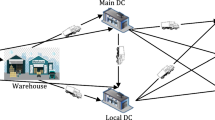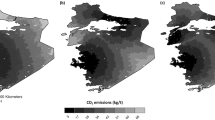Abstract
There can be different approaches to the management of resources within the context of multi-project scheduling problems. In general, approaches to multi-project scheduling problems consider the resources as a pool shared by all projects. On the other hand, when projects are distributed geographically or sharing resources between projects is not preferred, then this resource sharing policy may not be feasible. In such cases, the resources must be dedicated to individual projects throughout the project durations. This multi-project problem environment is defined here as the resource dedication problem (RDP). RDP is defined as the optimal dedication of resource capacities to different projects within the overall limits of the resources and with the objective of minimizing a predetermined objective function. The projects involved are multi-mode resource constrained project scheduling problems with finish to start zero time lag and non-preemptive activities and limited renewable and nonrenewable resources. Here, the characterization of RDP, its mathematical formulation and two different solution methodologies are presented. The first solution approach is a genetic algorithm employing a new improvement move called combinatorial auction for RDP, which is based on preferences of projects for resources. Two different methods for calculating the projects’ preferences based on linear and Lagrangian relaxation are proposed. The second solution approach is a Lagrangian relaxation based heuristic employing subgradient optimization. Numerical studies demonstrate that the proposed approaches are powerful methods for solving this problem.


Similar content being viewed by others
References
Alcaraz J, Marato C, Ruiz R (2003) Solving the multi-mode resource-constrained project scheduling problem with genetic algorithms. J Oper Res Soc 54:614–626
Boctor FF (1993) Heuristics for scheduling projects with resource restrictions and several resource-duration modes. Int J Prod Res 31(11):2547–2558
Bouleimen K, Lecocq H (1998) A new efficient simulated annealing algorithm for the resource constrained project scheduling problem and its multiple mode version. In: Barbarosoğlu G, Karabati S, Ozdamar L, Ulusoy G (eds) Proceedings of the sixth international workshop on project management and scheduling 49:268–281
Brucker P, Drexl A, Mohring R, Neumann K, Pesch E (1999) Resource constrained project scheduling: notation, classification, models and methods. Eur J Oper Res 112:3–41
Goncalves JF, Mendes JJM, Resende MGC (2008) A genetic algorithm for resource constrained multi-project scheduling problem. Eur J Oper Res 189:1171–1190
Hartmann S (2001) Project scheduling with multiple modes: a genetic algorithm. Ann Oper Res 102:111–135
Herroelen W, DeReyck B, Demeulemeester E (1998) Resource constrained project scheduling: a survey of recent developments. Comput Oper Res 25:279–302
Jozefowska J, Mika M, Rozycki R, Waligora G, Weglarz J (2001) Simulated annealing for multi-mode resource-constrained project scheduling problem. Ann Oper Res 102:137–155
Kim SY, Leachman RC (1993) Multi-project scheduling with explicit lateness costs. IIE Trans 25(2):34–44
Kolisch R, Sprecher A, Drexl A (1995) Characterization and generation of a general class of resource-constrained project scheduling problems. Manag Sci 41(10):1693–1703
Kolisch R, Sprecher A (1996) PSPLIB—a project scheduling problem library. Eur J Oper Res 96:205–216
Kolisch R, Padman R (2001) An integrated survey of deterministic project scheduling. OMEGA 29:249–272
Kurtulus IS, Narula SC (1985) Multi-project scheduling: analysis of project performance. IIE Trans 17(1):58–66
Lawrance SR, Morton TE (1993) Resource-constrained multi-project scheduling with tardy-costs: comparing myopic, bottleneck, and resource pricing heuristics. Eur J Oper Res 64:168–187
Lova A, Maroto C, Tormos P (2000) A multicriteria heuristic method to improve resource allocation in multiproject environment. Eur J Oper Res 127:408–424
Lova A, Tormos P, Cervantes M, Barber F (2009) An efficient hybrid genetic algorithm for scheduling projects with resource constraints and multiple execution modes. Int J Prod Econ 117(2):302–316
Mingozzi A, Maniezzo V, Ricciardelli S, Bianco L (1998) An exact algorithm for the resource-constrained project scheduling problem based on a new mathematical formulation. Manag Sci 44(5):714–72
Mittal ML, Kanda A (2009) Two phase heuristics for scheduling of multiple projects. Int J Oper Res 4(2):159–177
Mori M, Tseng CC (1997) A genetic algorithm for multi-mode resource constrained project scheduling problem. Eur J Oper Res 100:134–141
Ozdamar L, Ulusoy G (1995) A survey on the resource-constrained project scheduling problem. IIE Trans 27(5):574–586
Pritsker AAB, Watters LJ, Wolfe PM (1969) Multiproject scheduling with limited resources: a zero-one programming approach. Manag Sci 16(1):93–108
Speranza MG, Vercellis C (1993) Hierarchical models for multi-project planning and scheduling. Eur J Oper Res 64:312–325
Sprecher A, Hartmann S, Drexl A (1997) An exact algorithm for project scheduling with multiple modes. OR Spektrum 19:195–203
Sprecher A, Drexl A (1998) Multi-mode resource-constrained project scheduling by a simple and powerful sequencing algorithm. Eur J Oper Res 107:431–450
Talbot F B (1982) Resource-constrained project scheduling with time-resource trade-offs: the nonpreemptive case. Manag Sci 28(10):1199–1210
Tsubakitani S, Deckro RF (1990) A heuristic approach for multi-project scheduling with limited resources in the housing industry. Eur J Oper Res 49:80–91
Yang KK, Sum CC (1997) An evolution of due date, resource allocation, project release and activity scheduling rules in a multiproject environment. Eur J Oper Res 103:139–154
Zapata JC, Hodge BM, Reklaitis GV (2008) The multimode resource constrained multiproject scheduling problem: alternative formulations. AlChe J 54(8):2101–2119
Acknowledgments
We gratefully acknowledge the support given by the Scientific and Technological Research Council of Turkey (TUBITAK) through Project Number MAG 109M571 and Bogazici University Scientific Research Projects (BAP) through Project Number O9HA302D.
Author information
Authors and Affiliations
Corresponding author
Rights and permissions
About this article
Cite this article
Beşikci, U., Bilge, Ü. & Ulusoy, G. Resource dedication problem in a multi-project environment. Flex Serv Manuf J 25, 206–229 (2013). https://doi.org/10.1007/s10696-012-9140-9
Published:
Issue Date:
DOI: https://doi.org/10.1007/s10696-012-9140-9




